Should Latina/o Roles Be Cast with Non-Latina/o Actors?
The casting of white actors in roles specifically written for people of color is nothing new. In recent memory, the original production of Miss Saigon in 1991 was embroiled in controversy when Jonathan Pryce was cast as The Engineer, the half-Vietnamese and half-French owner of Dreamland. And 1996 saw the infamous casting debate between August Wilson and Robert Brustein in which Wilson denounced color-blind casting leading Brustein to label Wilson’s thoughts as an “appeal for separatism.”
Nearly twenty years later, we are still having this debate.
Exhibit A: Gilbert and Sullivan’s The Mikado. The New York Gilbert & Sullivan Players cancelled their production of The Mikado after a poster promoting the show circulated online causing an outcry over the use of yellow face. (Find HowlRound coverage here.)
Exhibit B: Katori Hall’s The Mountaintop. Only after the production at Kent State University did playwright Katori Hall learn that the director had cast a white actor in the role of Martin Luther King, Jr.
Exhibit C: Lloyd Suh’s Jesus in India. Playwright Lloyd Suh halted the production of his play at Clarion University when they refused to recast roles written specifically for actors of color. The university had two white actors and one mixed-race actor in those roles.
The last two examples were college productions.
Productions at colleges and universities offer Latina/o playwrights opportunities to make a livelihood and have their work seen by the next generation of theatremakers. However, as the diversity of a theatre program’s acting pool can greatly vary—are there Latina/o actors to take on roles written for them by Latina/o playwrights?
In light of these recent controversies over casting white actors in ethnically specific roles, the Café Onda Editorial Board asked several Latina/o playwrights the following questions:
Should Latina/o roles be cast with non-Latina/o actors? How do you approach productions at colleges and universities when your play calls for characters of color but the acting pool at the university may or may not have the actors? How are you thinking about casting?
Martín Zimmerman: First I want to say I wholeheartedly support playwrights who stop a university production of their work that has cast white actors in roles written for actors of color. But I also feel I'm in no position to judge playwrights of color who agree to change a casting breakdown because a university has said it won't produce their play otherwise. I'm sympathetic to the fact that refusing such requests can mean taking money out of the hands of playwrights of color.
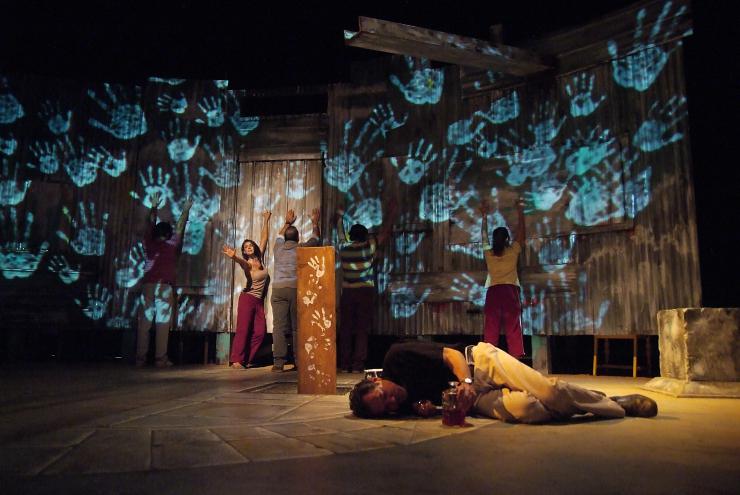
I would not let a department exclusively cast white actors in all (or even most of) the major roles of one of my plays. That's where I draw my own line (since I've never been in a position to have this discussion with a university department). But beyond that line I'm open to discussion. That personal rule also goes for plays of mine in which I don't specify ethnicity in my character breakdowns. For those particular plays (most of my plays), I make it clear that no specified ethnicities in the character breakdowns does not mean the play should have an all-white cast, but rather that it should have a racially diverse cast.
But it also would be important for me, personally, to try to turn a university's request to alter one of my casting breakdowns into a dialogue about how to increase diversity in that university's department.
And that's because I've been fortunate enough to see university faculty lead efforts to diversify departments by programming work in which they needed to go outside their known actor pool to cast. These faculty just firmly believed they would find good actors of color to fill those roles if they worked hard enough. And 100 percent of the time they found those actors of color.
I've been fortunate enough to see university faculty lead efforts to diversify departments by programming work they needed to go outside their known actor pool to cast. These faculties just firmly believed they would find good actors of color to fill those roles if they worked hard enough. And 100 percent of the time they found those actors of color. — Martín Zimmerman
Given that, I would be reticent to outright reject a university's request to do one of my plays if they asked me to alter the casting breakdown. I would instead try to seize it as an opportunity to strategize about the real and immediate steps that university can take to cultivate a more racially diverse pool of actors. And if altering my casting breakdown somewhat ends up creating opportunities for several actors of color who wouldn't have had those opportunities were that university to produce a different play? And leads that university to cultivate a more diverse actor pool? In that case, I'd think my decision was worth it.
Marisela Treviño Orta: Almost all of my characters are Latina/o. And most of them are women. Back in the Bay Area my Latina actress friends loved this.
Why are the worlds of my plays populated like this? At first, that was who just showed up in my imagination. Now I'm more intentional. I see that I am creating roles for Latina/o actors. I am creating stories that need to be told and added to the American canon.
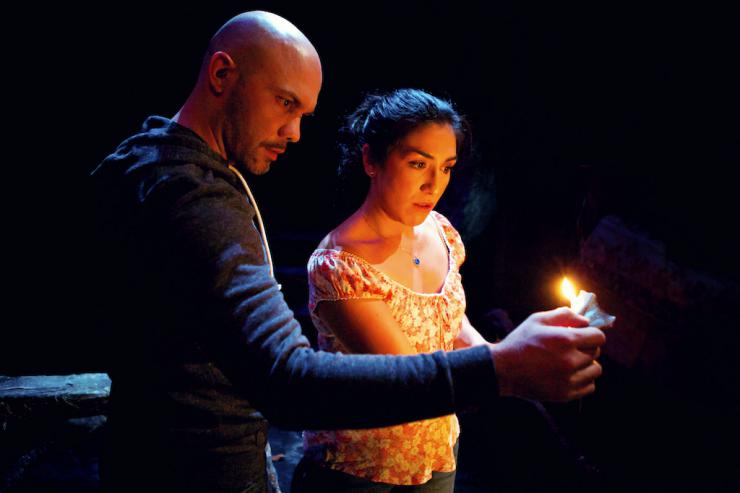
In the Bay Area I had go-to actors for readings and productions. But now I'm in graduate school. In Iowa. There are three other Latina/o grad students in my program. Only two of them are actors. And I know of one undergrad in the theatre department.
How will I cast my own shows?
I feel very conflicted. Not just about casting for the private workshop reading I have each semester. But for the potential university productions that are in discussion.
Can my work be done at a university level without causing harm? And by harm I mean perpetuating brown face?
Can my work be done at a university level without causing harm? And by harm I mean perpetuating brown face? —Marisela Treviño Orta
I recently shared these thoughts with a fellow playwright, friend, and graduate of my program. He said, “Don't write for the program..”Meaning, don't adjust what I write about to fit the acting pool that's there. I need to write for myself. I agree with that. But where does that leave me with casting?
Again, conflicted. And my thoughts are ever evolving.
I have thought about allowing the other actors of color to step into those roles. If I was writing to provide Latina/o actors with opportunities, perhaps giving opportunities for other actors of color is my answer.
Magdalena Gómez:
(This poem was originally written in 1996 in support of August Wilson on the “color blind” casting debate.)
Casting Call
Yes, of course
you may audition
for the role of an Asian
if you are willing to
walk down the street
and have somebody’s
nine year old
give you his version
of Jackie Chan
as Mommy
gushes over his
cuteness.
Yes, by all means
let a white man
play Paul Robeson,
a white woman play
Ma Rainey;
no problem.
However,
you will be expected
to understudy
for all accusations,
ridicule, exile and lynchings,
verbal, political
or otherwise.
Yes, let’s have
an all white cast
of Fences
wait in the wings
for the moments
when you will have to get
out of your jogging clothes
and into a suit
to withdraw money
from your own bank account
without being wrestled
to the ground,
or followed when
attempting to buy socks.
Be prepared to get
pulled over
for the insolence
of driving a Lexus
or any car
with a working
muffler.
First Nation Peoples may be played
by white acting students.
They must be willing
to submit to
public interrogations
on the status of
their Indian-ness,
be poked by curious
index fingers
and greeted with
HOW.
They will be expected
to heal canker sores
and hemorrhoids
with a rattle,
impart wisdom
to the New Age rich,
and respond
when called
Pocahontas,
regardless of gender.
It would be my pleasure
to have white actors
play Arabs
as long as they are
available for extended runs
in prison camps,
and be on call
for career ending
cameos and extended solos
that will separate them
from their agents, families,
friends, and union reps.
I myself would
prefer to be played
by a white man
as long as he is willing
to undergo my yearly mammogram,
pap smear
and be paid much less
than he’s worth.
Oh, yes, he must be willing
to be called a Puerto Rican whore
with a chip on her shoulder
when he disagrees with anyone
who was born with clout
and thinks the Great White Way
should stay that way.
Reconnaissance can be a form of resistance to the tyranny of exclusionary racism, outright negligence, or the ignorance of convenience. People of color may also suffer from whiteness, a by-product of the colonized mind. We cannot rule out the complicity of our own in any situation regarding racial and ethnic parity.
Prevention as intervention. Ask the questions before you sign, and the most important question of all: At what price production? —Magdalena Gómez
If one is either pursuing, or invited to have a play produced in an academic institution, or anywhere for that matter, one must first be clear of one's casting vision for the work.
Once, at an audition to perform one of my solo shows for a women’s festival, at the turn of the 21st century, I was thrust into a time machine of insult. The festival was to be held at a university affiliated theatre. After the audition I was told my audition was “fabulous” and left fairly certain I had been cast. Soon thereafter, I learned that the same team that had auditioned me, put out a casting notice for my solo show that read: “Seeking a Latina or someone who can pass.” I ended up having to educate that team of theatre “professionals” as to why what they had done was reprehensible. I performed my own work in the festival, each night dealing with childish retaliatory behaviors by one of the festival directors. That experience affirmed the decision I had made in the early 1970s, when a high-powered casting agent, dangling a golden carrot asked me “to pass” and I refused. The agent pushed regardless of how clear it was that the request was deeply wounding: “You’re beautiful, you can sing, you’re the perfect ingénue and Maybelline is interested in you.” That moment affirmed my earlier decision to be a performance poet. I knew it would be the only way I could get my work performed and allow me to maintain control of my cultural production.
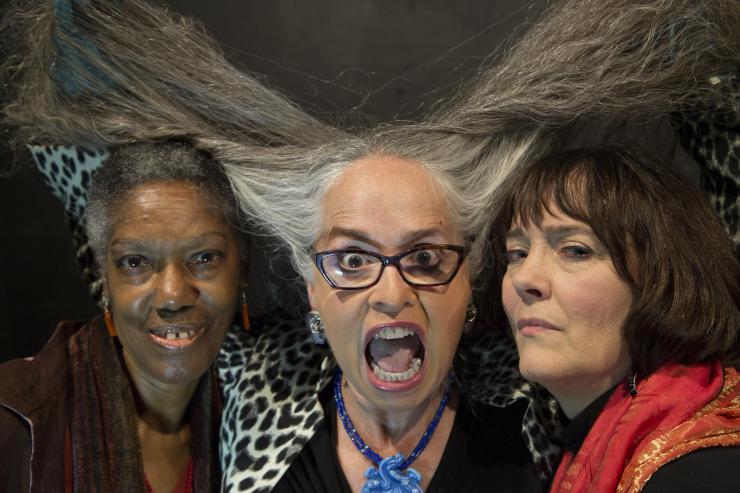
Since getting work produced all too often feels like a miracle, the playwright might not think to ask questions regarding the director's vision. Yes, it is the director who does the casting, however, the playwright might insist on having a conversation prior to auditions to clarify expectations. In the case of colleges and universities it would be in alignment with “town/gown” initiatives, to share audition notices with surrounding communities. Prevention as intervention. Ask the questions before you sign, and the most important question of all: At what price production?
Irma Mayorga: I think the permissions you want to put on your plays is a personal choice for every playwright. For me, there is no all-encompassing “yes” or “no” answer to inquiries. And, I also believe there is no blanket answer that can be applied to every school: location matters, for example. For me, it is a case-by-case basis, which takes time, care, and energy. “Why this play for your school/community?” is one of my top questions—especially if you do not have the population to fill the roles? With this query, it becomes a conversation, not an edict on my part.
I cannot easily envision non-Latina/o actors in the roles of my plays about Mexican American life-worlds. I have written plays that hope to articulate the US Latina/o body in different social contexts and, with that, a certain representation of the US Latina/o life-world through means of a live-based art form, theatre. Stories of this sort are not the only stories I have crafted nor am capable of writing, but I chose to write stories of this kind in the name of the absence and invisibility of Latina/o bodies and life-worlds on the US American stage: this is why I started writing plays.
Plays are also the images constructed, the moods conjured, the totality of sensory and verbal devices used in a liminal space that is inhabited for that moment of telling a story to folks seated around you. —Irma Mayorga
As a woman of color, that is, as a Latina who can never under any circumstances pass for white, I am all too aware of the racial significations inscribed on my body that proceed and oftentimes impede me. These impediments and the way bodies have learned to mediate their racial significations is part of the story I want to tell on the stage.
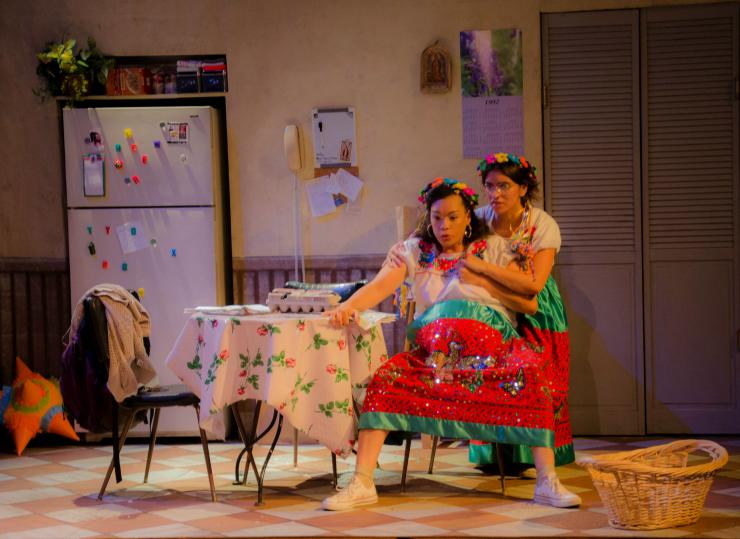
As a playwright I am not solely concerned with words on a page; plays are more than thoughts and dialogues spoken aloud, more than words said. Plays are also the images constructed, the moods conjured, the totality of sensory and verbal devices used in a liminal space that is inhabited for that moment of telling a story to folks seated around you.
Elaine Romero: Here’s the call I’ve received many times, “I love your play, but we don’t have Latina/o actors,” This has been true not only of all-Latina/o plays, but plays with as few as two Latina/o characters. Universities that have performed my work have cast the Latina/o actors outside of their theatre departments and even outside of their universities. These artists have received pushback from students for taking a role and making it not available to them. The authentic representation of my work has cost these artists.
Should universities who do not have students of color still be able to do my plays? The educator says yes and the playwright says no.—Elaine Romero
As writers of color, we need highly trained actors. These actors need the full benefit of the education at all universities without obstacles to entry via the canon itself, presuppositions about who should play whom, and being limited to roles that writers of color have written for them. Color-blind casting has to happen when students audition for program entry. It has to happen in high school and grade school. It has to become normalized, second-nature. If students of color have limitations on their ability to grow in a program, they will not dedicate their education to the theatre.

I want Latina/o actors to play Latina/o roles in my plays. A recent statement by the Dramatists Guild notes:
Play Licenses clearly state that 'no change to the play, including text, title, and stage directions are permitted without the approval of the author,’ or words to that effect. Casting is an implicit part of the stage directions, to pretend otherwise is disingenuous.
No matter how a director slices it, casting falls under the purview of the playwright’s copyright and must be legally handled as such. Yes, I do not want my diversity to be a barrier. The truth is that universities are worried about diversifying and are wondering how. Playwrights want students exposed to their work and wondering how. The educator in me fights with the playwright in me. Should universities who do not have students of color still be able to do my plays? The educator says yes and the playwright says no. If universities produce ethnically specific plays with any of the available swap-out options, what are we teaching the next generation of theatre artists? Experience has taught me that artists will duplicate whatever they have learned in school. I propose a national Diversified Guest Artist Program. This Diversified Guest Artist Program would include directors as well. The program would include training and mentorship for students of color. As a field, we have to find out what the barriers of entry are for students of color and find ways to address the diversification of our future. Otherwise, our future will be our past.

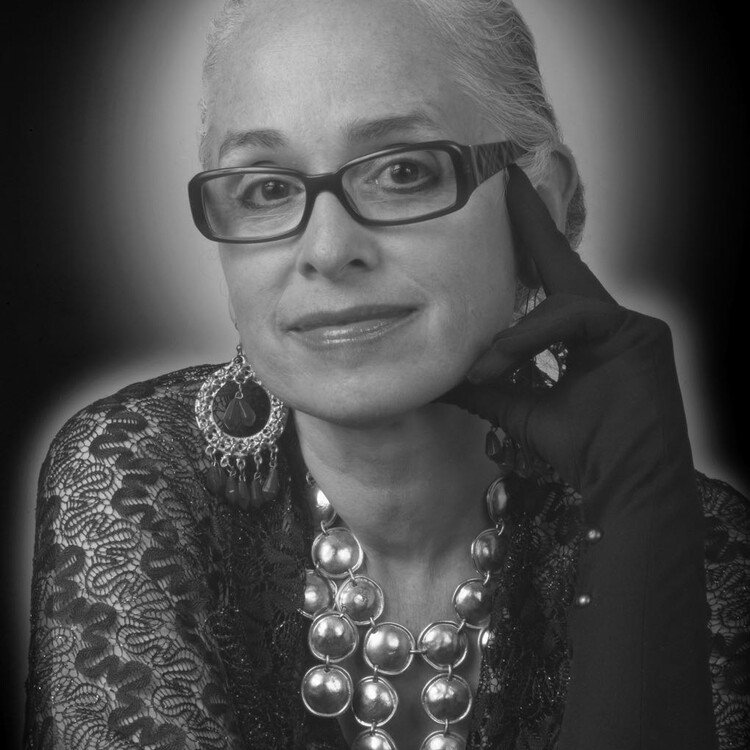
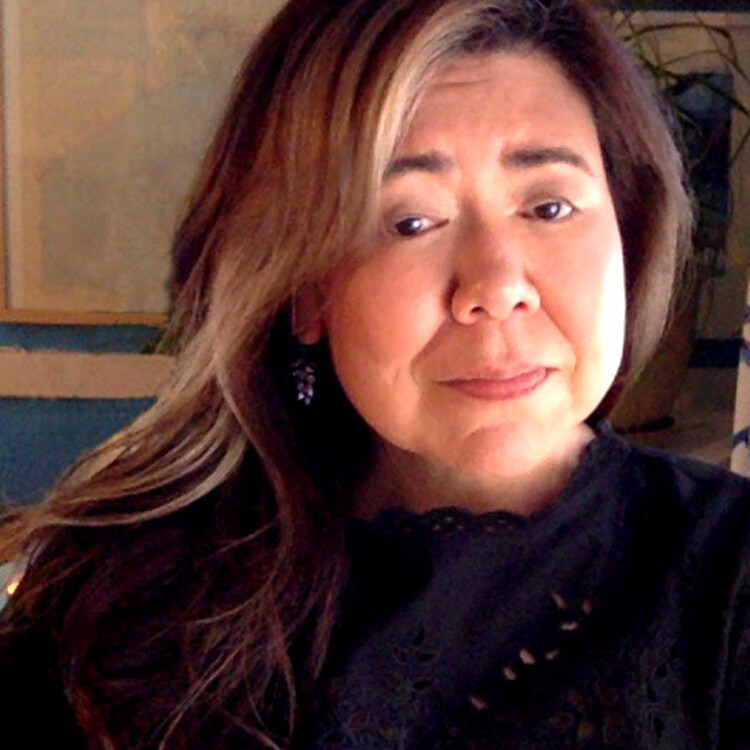

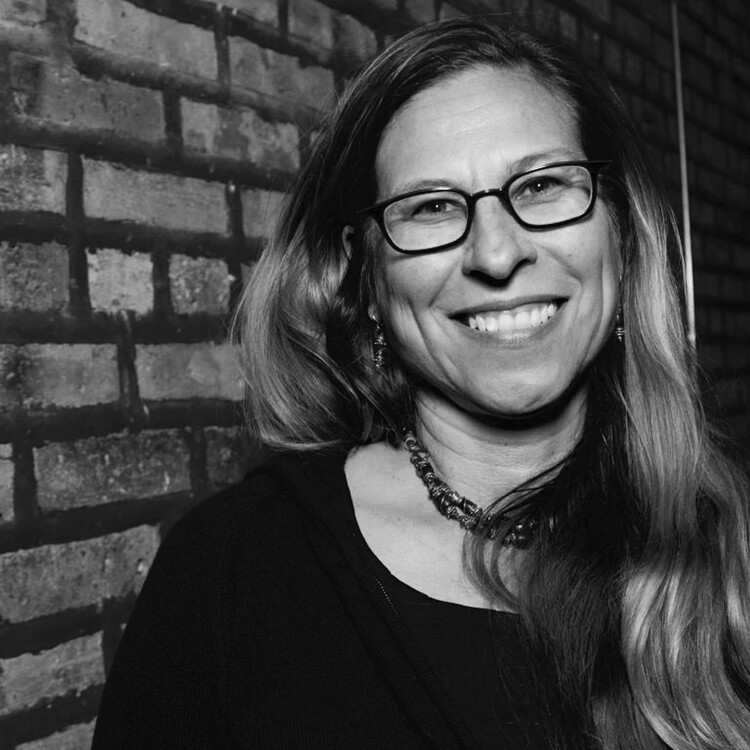

Comments
The article is just the start of the conversation—we want to know what you think about this subject, too! HowlRound is a space for knowledge-sharing, and we welcome spirited, thoughtful, and on-topic dialogue. Find our full comments policy here
Elaine Romero and I almost think the same way. My educator hat says let the non-Latino actors get the roles but my playwright hat says otherwise.
But here is the thing, my plays are bilingual and I mean bilingual from the beginning to the end. So not only do my plays required Latin@s actors, they also required actors who can speak both English and Spanish. Unlike many of my fellow playwrights (and I don't mean this as a criticism), I hardly write plays that are 90% English and 10% Spanish. Most likely my plays are about 50/50 or 80/20. As I said once at a panel, "I don't "salt and pepper" my plays with my culture and language. I marinate my plays with my culture and language."
Long ago, while in grad school (I remember this because Marisela Treviño-Orta is going through it) I wrote a play where one of the roles was of the mother, who, by nature of my writing, spoke with a Mexican accent, an accent, I actually wrote in the lines of the character, (Ju instead of you, tank ju instead of thank you, Biew instead of view, etc) The show was cast at the university, and for the sake of "equal opportunity" the role of the mother was given to a non-Latino student. She was a lovely person and good actress, however, she refused to perform the lines the way I had written them because and I quote, "that's not how a Mexican speaks." And of course, I, being a Mexican immigrant with a family full of Mexican immigrants where everyone speaks with a Mexican accent, wouldn't know how a "real Mexican immigrant" speaks. Those were not very happy days for me.
I keep thinking of what Luis Valdez has said all his life, "if people don't go to the theatre, then the theatre must go to the people." So, if I write Latin@ bilingual characters, shouldn't those roles go to Latin@s? Isn't that the whole purpose of writing about our experiences? We want to see ourselves on stage, because, and I mean this with the outmost respect, Edward Albee, Tony Kushner, Sara Ruhl, or Theresa Rebeck sure aren't writing about my people, my problems, my identity, my immigrant life, my brown face, and many other things that made me who I am.
I learned, from many theatre luminaries (Jorge Huerta, Luis Valdez, Guillermo Reyes, Susan-Lori Parks, Garry Garrison, Cherríe Moraga) that we have to create our own spaces, our own narratives, our own live's on stage because 'if we don't, then, who will create them for us?" So now that I'm creating these worlds with this brown faces where I can see myself and my community on the stage, now I have to compromise my world and my representation with non-Latin@s? If that is the case, whenever one of my plays gets produced and non-Latin@ actor is cast in the males roles based on me, I want Channing Tatum and Zac Efron to play the roles.
Of course, I also know that some roles (at least those created in some of my plays) can be played by non-Latin@s. Why is that? Because I have created them that way.
My struggle with this whole conversation is this: If we, the playwrights believe that casting a non-Latin@ actors in a Latin@ role can be done, then why are we writing narratives about our people, culture, and experiences? Are we doing it for the money? (Ha!) Or are we doing it because even if Natalie Wood plays Maria, or Marlon Brandon plays Zapata, or Hank Azaria plays Agador, or Madonna plays Evita, or Viggo Mortensen plays Lalin, or Armand Assante plays Cesar Castillo, or Ben Affleck plays Tony Mendez (and the list goes on) at least our stories are being told, and by default others are learning about us? And as a writer my work is getting done? Is that it? Because if that is the case, I can't wait to see the remake of the film LUMINARIAS, by Evelina Fernadez, starring Renee Zellweger, Drew Barrymore, Sandra Bullock, Sara Jessica Parker, and Elizabeth Hurley.
Don't miss playwright Alvaro Saar Rios' thoughts on this topic!
"As a Latino playwright, I support casting non-Latinos in Latina/o roles in my plays at academic institutions but only under the following condition: casting a non-Latina/o in a Latina/o specific role should only be considered when it does not take away the opportunity from a Latina/o actor or another actor of color who could potentially play that role." - Alvaro Saar Rios
http://howlround.com/yes-no...
I am not so sure that the race, sex, religion, sexual orientation, age (or other immutable characteristics) of the performer is covered by copyright. As I understand it, copyright can dictate the characteristics of the character. However, because one can only perform a copyrighted work by licensing it, the playwright can require a license agreement with provisions that attempt to dictate fulfilling the playwright's intent. So, if the author can control casting at all, it is through contract provisions, not directly because of copyright. [To paint an awkward scenario: White woman, passing as Latina, auditions for a Latina-designated part and is cast. She is found out and is fired. I think those facts would support a successful race discrimination claim, in the same way that a Latina woman, passing for white, is cast as a white character and is fired when her "true race" is discovered.] I think that all of us engaging in this conversation can agree that discrimination against someone because of their race is wrong. The Civil Rights Act of 1964, although it prohibits discrimination based on race, does not define race. How do we define race for purposes of casting? Is President Obama white? At what point does our definition of race start to sound as awful as the variety of outdated state statutes that defined Black with "formulas" that ranged from "one drop" to 1/8 or 1/16? Half and half -- sure, that counts as qualifying the person for the non-white role, but at what point does it change? What defines us? Who defines us? While "googling" to confirm my recollection of the one-drop rule, I came across this interesting New Yorker article from 1994. http://www.afn.org/~dks/rac... . In the last paragraph of that article, it cites Congressman Tom Sawyer (then chair of the House Sub-committee on Census, Statistics, and
Postal Personnel) as stating: "Part of the difficulty is that we are
dealing with the illusion of precision. . . . We act as if we knew what we're talking about when we talk
about race, and we don't." Discrimination based on race is wrong. Will there be a day when we all recognize that we are all the same race -- the human race?
"Color Blindness" as a concept is in of itself extremely problematic. There are many articles where one can read a diversity of opinions on the topic. I personally have always abhorred the term, as it colludes with erasure, denial and provides a quick fix response that is both shallow and insulting.
Here is one article for starters: https://www.psychologytoday...
Out of justice and fairness, playwrights and directors should try their best to hire dark-skinned Latinos to make up for past discrimination and whitewashing.
I loved this discussion, especially Magdalena's poem...dope! I really liked Lin Manuel's response in a recent media source in which he said that the author's intent is most important. For some authors, a non-Latin@ actor playing a Latin@ role is not up for discussion. For others, another actor of color is a suitable alternative (ie: a Black actor, middle eastern actor, etc.) And for some, it is okay to cast a white actor when casting resources are limited (...You do you.) I agree with Magdalena that these discussions need to happen before a production begins so that each playwright can state their personal beliefs and values before a full team is invested in the process. I think the biggest problem in all of the aforementioned examples is that the playwright was not involved in the decision. If one gets permission from the playwright to do casting differently for whatever reason then great...thanks for respecting the writer's words. If one does not secure permission from the playwright then they should expect a cacophony of disappointed voices speaking up.
Here is Lin-Manuel Miranda's thoughts on casting: http://www.hesherman.com/20...
The real issue is the failure by schools and universities to train/recruit diverse actors.
If professional theaters don't have a strong batch of trained professional actors of color in their area, they have two choices:
1) Stick to producing plays about white characters OR
2) Cast white actors in roles that would otherwise go to a person of color.
If you're in LA, Chicago, or NYC, or some other very large metro area, it's comparatively easy to find talented, trained actors of many races. But that's not always the case everywhere else in the country.
Hello, I am a latin@ actor and writer. I believe the lack of diversity in the university system alone is a massive problem. Universities, and their theatre department, need to recruit latin@ students to their schools and programs similar to casting directors needing to find the talent to fill their seasons.
Last year I understudied a role that was written for a latin@ but was given to a white male. Mind you, we were playing a luchador, so we were both masked (I'm not sure if that makes it worse or better). The theatre is the second largest theatre in my city. It is happening all the time, even if there is latin@ talent available.
I'm approaching 26 and am confident that change is happening and will continue to happen. The dialogue between latin@ actors, directors and writers is key to continue this process and help us recognize that we are not alone in this discussion. Thank you all for your words.
This is gonna be in response to the first question posed: Should Latina/o roles be cast with non-Latina/o actors?
My answer is it depends on the race of the character. I think that this conversation still needs to be diversified more.
One of the most popular shows with Latinx characters is "Once On This Island," but how often are non-Latinx actors used to represent these Haitian characters? (nearly always!) Very often, that conversation is not even brought up because we see the story of "Once On This Island", as one about race.
"The characters are Black so any Black actor will do".
I think that each Latinx show needs to be dealt with in the way we deal with OOTI. What race are the Latinx characters? In OOTI's case, all the characters are Black. Should then, non-Latinx artists of that race be allowed to represent those characters? I'd say that yes. Afro-US actors should be encouraged to play Afro-Latinx characters. Not only does that build a bridge to a better understand Latinx cultures, but it also helps dismantle systems of Anti-Blackness prevalent in Latinx communities.
As an Indigenous playwright of Salvadoran background, I would personally prefer to have Navajo actors play my Salvadoran characters, than have White Latinx actors play those roles. I would feel highly uncomfortable if White Latinx actors played my brown characters. It's not just about Latinx culture. We need to talk about race too.
What about Latinx roles that are not POCs- one that comes to mind is Eva Peron in EVITA.... which is often cast with a non-Latina white actor. Is that acceptable (a white womyn playing another white womyn)? That's a tougher question. I think that with White Latinx roles, it is easier to say that non-Latinx artists of that race should keep their hands off because White non-Latinx roles are much more available, in comparison to White Latinx roles.
The Latinx plays being produced- the ones I see posted on here- are clearly about race. I see hupiles and I see afros. I see people actively doing work that diversifies that Latin American narrative. All Latinx characters obviously have a race. It doesn't benefit us or Anglx community by skimming through that fact in the way we speak about Latinidad to Anglx folks.
Mis dos centavitos.
P.S. Muchas gracias a todxs quien dieron su voz en este articulo. Such important conversations!
While I DO agree that we should cast race-specifically when the race is specified, I think we need to consider the implications of being too rigid around it:
If we are strict about casting, what if that means that some shows rarely or never get produced?
There are many stories that I would argue NEED to be told, particularly to majority-white audiences. But if we can't find the right actors for the parts, it means that many audiences outside of big cities will never get to see some plays.
(For the record, I'm NOT saying we should do something egregiously obvious like casting a white actor as a black character.)
Should people only play characters that are just like themselves? I'm not sure I agree.
Also, skin color does not mean that the actor necessarily shares the life experiences of that character. So where do you draw the line?
Don't get me wrong, we SHOULD adhere to the playwright's wishes....and we SHOULD cast appropriately whenever the race of the character is specified...
...but what is the definition of representation? Skin color alone?
What does it mean to be a "real" latino/a?
I see "colorblind" casting as only a means to bring diversity to traditionally all white male casts that were made so by the laws of the era (as in Shakespeare), it should not work the other way around. As I experience in the startup world of Silicon Valley, the fallacy of a meritocracy is that it assumes all begin with the same access and opportunity as the groups that dominate (in most cases, white males). The onus is on the universities to bring on a diverse group of students at the very least proportionally representative of the general population. When they claim that their casting is based on merit and the results are a class of mostly white male actors, they insinuate that women and minorities are simply consistently less qualified than white men. Frankly, that is mathematically impossible.
Playwrights write non-white roles specifically to give a voice to people of color. To bestow that voice upon a white actor really misses the point. Much like when a recent venture capital firm hosted a "women's symposium" with all male experts teaching them how to succeed. ;)
A few thoughts on the matter, none of which will settle it.
On authorial intent: half the time I don’t know what I
intend when I write my plays. Sometimes, it’s clear from the outset, sometimes not. I find my intent shifting and evolving with every production. But if I write a role for a Latina, I want that company to exert the best possible effort find the best possible Latina
for it. No excuses.
I made it my mission to get more Latin@ actors work. To write the roles they can sink their teeth into. I pride myself on that. But like Ms. Romero, I’ve heard many artistic directors tell me they don’t have the
talent pool to produce my works. But that didn’t stop a small Napa Valley community college from mounting an extraordinary production of my play Lydia. They made some allowances for casting, which made us all take pause, but in the end all that mattered was their passion to see the show done. The greater good was served because the right latin@ student actors got their shot at last.
I’ve been assailed for allowing non-Latin@s to be cast in some productions of my plays, when actually, these actors were of Latino
background and some spoke better Spanish than their critics. They just didn’t conform to the pre-received notion of what a Latin@ looks like. By the same token, I’ve seen productions where Latin@s were cast and looked the part, but just weren’t up to the task, and sometimes were grossly miscast. Then I’ve encountered times where, against my reservations, some specifically Latino and
Anglo roles in my plays have gone to actors of color and these worked tremendously well. They not only supported the premise of the work, but said something new and fresh about the culture that I hadn’t considered before. In all these instances, the play survived.
I’ve spoken with many leaders of university programs who have tried to recruit the Latin@ talent that is out there, but they always hold out for the more well-endowed programs like those of NYU, Brown, Yale and UCSD, among many others. Who wants to study theatre in the Texas panhandle when they can get a full ride in New York?
I always remind myself that we’re in the business of metaphor. The play is not real life; it stands for real life. The set is not an actual place, the characters are not actual people. We’re asking the audience to complete the picture for us. To enter into this metaphor in order to relate an essential human story and its truth. This requires trusting their imaginations. Some works require specific cultural and racial considerations because that’s what the stories are about; the metaphor requires it and we have to respect that. But sometimes, there’s more than one way to cook a metaphor. I’ve seen film of Japanese Botuh performers rolling down the Scottish braes wearing nothing but kilts, revealing something in between cultures that landed with me. And the way Danny Hoch inhabits the Black and Latino hip-hop experience in his work is so startling and true. In the end, for me, it’s about knowing the metaphor, inhabiting it on its terms and knowing how far it can be stretched before it starts to make no sense at all.
I'm an Equity actor as well as a playwright. I don't see enough of these roles out in the professional theater either. I have a collaborator, a white director, who DOES NOT UNDERSTAND why I object to a non-latina playing a Cuban in our collaboration. He isn't stupid and he's not racist, he's a lovely person, and STILL, "But she looks Cuban!" "Why should it matter, she's an actress." And he's a man of the theatre. So if someone like him doesn't get it, I'm not sure anyone does. And now it's worse than ever to be an actor because casting a person like me in a play becomes a symbol, a statement. No such thing as colorblind.
There are still so many playwrights out there that I'd love to hear from on this issue. Hopefully we'll see them here in the comments.
Thank you to these five playwrights for giving voice to the
(not so) recent debates about casting. These are conversations we absolutely
need to be having if we are going to advance the art form and truly update the
narrative of the (New) American Theatre in the 21st Century. Magdalena
Gómez’s poem “Casting Call”—which she wrote in 1996 following the controversy
of color-blind casting described at the beginning of the essay—shows us how
things haven’t changed that much even though the country and theater landscape
have progressed substantially in the last 20 years. Gómez’s poem could well
have been written today and that says a lot.
I’m thankful that we have HowlRound and Café Onda to stage
these necessary conversations. I’m thankful for the wonderful socially
conscious folks at HowlRound for creating and maintaining this safe space. And,
I’m thankful for these five playwrights and the countless others who have
weighed in on this issue.